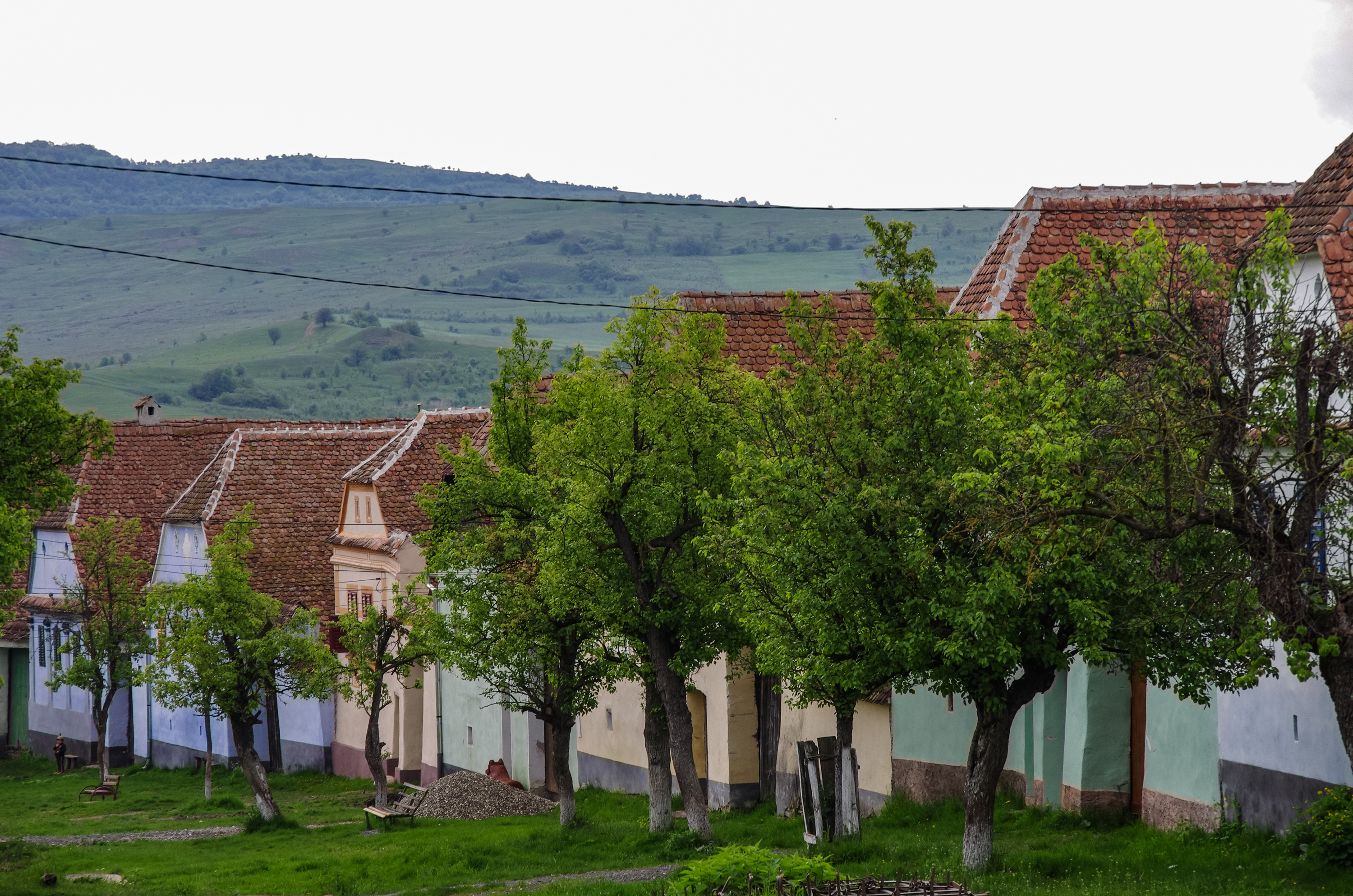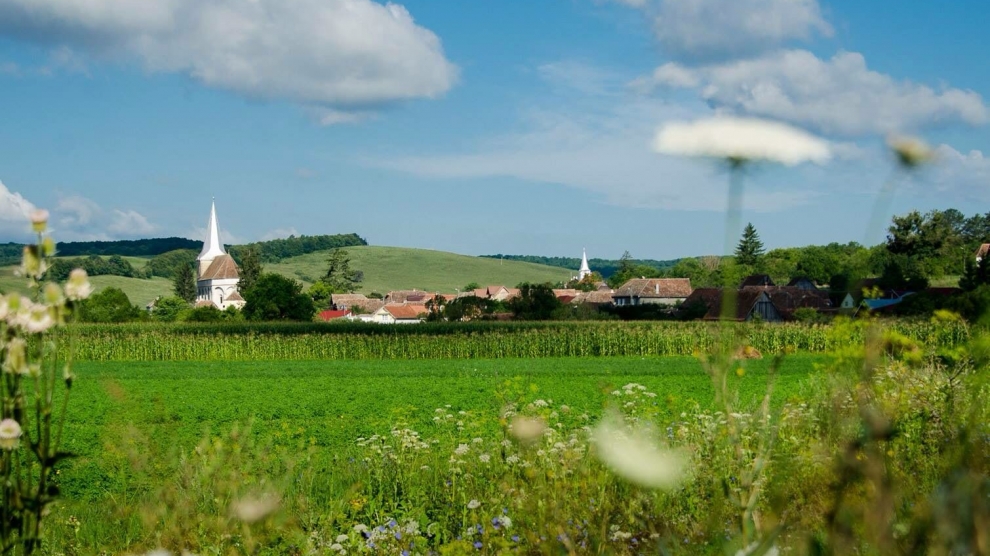To Șoarș, a small village just over the hills from the Transylvanian city of Făgăraș, a village in which my mother-in-law worked (at the mayor’s office) for a time in the 1980s. Some friends have a house there, and as my wife an I were at a loose end this past weekend, and in search of some splendid isolation away from Bucharest, where just about everyone appears to have decided that Covid-19 no longer exists, we decided to take a short trip: we hadn’t been in getting on for a decade.
Șoarș – like many of the villages in southern Transylvania – was a Saxon settlement all but abandoned in 1990 when the population upped sticks and fled to Germany. Few have returned. The village (like most in the area) is struggling. Although it’s just 12 kilometres from Făgăraș the less than optimum state of the roads can turn the journey into a bit of a bone-crusher that can take a good half an hour or more.
Șoarș is not far from Viscri, one of the most fashionable villages in Romania. It has been made famous by none other than Prince Charles, who owns property there.
Indeed, it is difficult to even mention Viscri – not least if you are English – without the name of the heir to the British throne cropping up. He is almost invariably mentioned in glowing terms, and when I proffer my own views on the man, not always entirely complimentary, offence is sometimes taken.
Anyway, being so close to Viscri we decided to pay the place a visit, to see what kind of fame and riches the patronage of Charles has brought the village.
Certainly, the village’s fortified church is impressive and worth a visit. A couple of houses have been renovated and offer accommodation, although the wealthy foreign visitors who usually make up the bulk of their clientele are currently absent. Outside some of the village’s houses locals had put handicrafts and such like on tables in the hope of attracting the odd buyer, yet the overall impression you get visiting Viscri is much the same as that you get anywhere else in the Romanian countryside: there’s much that can be improved. If this is a showpiece, Potemkin-village, woe betide a few other places, such as Rotbav, a poverty-stricken village through which we drove the following day.
Viscri today is the Transylvanian countryside in the image of Charles. For him, Viscri is more or less as good as it should get for a Romanian peasant. A home made of traditional materials, some land to farm (using traditional, back-breaking methods) and (in normal years) a regular stream of visitors to keep the village’s pensions in business. Why would anyone want more? Why would anyone aspire to the kind of life that, oh, Charles himself enjoys? A life of unadulterated privilege and luxury? No, dear peasants: such things are not for the likes of you.

—
Indeed they are not. For while Charles might want to make the life of the Romanian peasant (or at least some of them) a little less uncomfortable, he would be horrified if the population of the entire Romanian countryside decided en bloc to down tools in order to demand something better. It’s why I reject the notion that Charles is a “friend of Romania”. Charles is a reactionary determined to conserve the existing social order. If he genuinely cared for the Romanian peasant he would be trying to turn that order upside down. Yes, he may bring in a few tourists, but then so does Dracula, and you’d hardly call him an agent of progressive social change.
Viscri then is not yet a model for the for the future of the Romanian countryside, neither is it the kind of place we could ever see ourselves settling down. For what it’s worth, there are plenty of other villages and churches in the area far more worthy of your time: Cincu and Moșna in particular. Even Șoarș – though its fortified church is little more than a ruin these days – is a far nicer place in our opinion than Viscri. And all of the places we have mentioned offer far better access than Viscri. The restored fortress at Rupea is also worth a look.
And yet for all my objections to the “happy peasant” ideal, I have no doubts whatsoever that there is a genuine, special charm to the entire area. I by and large loved my time there, as I do each time I visit. I am convinced that agro-tourism is a genuine alternative to working the land, and a way out of poverty and subsistence farming. Where I do have doubts is with the idea that such a route is available to anyone: right now it certainly isn’t, while even in normal years there simply aren’t enough visitors to go round. (There are also several other bureaucratic obstacles facing anyone wanting to open a pension. One is the need to obtain a ‘fire evacuation route’ certificate from the county fire brigade. Even if your property has just one room and one exit, the certificate – without which you can’t legally operate a pension of any kind – costs more than many peasants can afford).
Romania’s countryside is often referred to as “Europe as it once was”. Should we not ask ourselves Why? Why is the rest of Europe no longer like rural Romania?
Europe long ago realised that it doesn’t want to live like a peasant. It doesn’t want to be sentenced to a lifetime of back-breaking agricultural labour using only medieval-era tools.
If other Europeans long ago decided they don’t fancy a lifetime of subsistence farming, why should Romanians be any different?
Travel and tourism will change in the post-Covid-19 world. This is welcome. There will increasingly be a place for countryside getaways, for slower holidays, for a return to nature, and both Șoarș and the surrounding area is ideally placed to take advantage. What’s important is that we find a balance between preserving what makes these places special while ensuring they develop, offering their inhabitants the kind of lifestyle we all aspire to.
Preserving poverty and backwardness is not an option.
—
Unlike many news and information platforms, Emerging Europe is free to read, and always will be. There is no paywall here. We are independent, not affiliated with nor representing any political party or business organisation. We want the very best for emerging Europe, nothing more, nothing less. Your support will help us continue to spread the word about this amazing region.
You can contribute here. Thank you.


